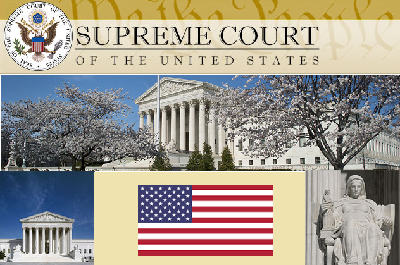 |
 |

A New York based Nigerian lawyer, Chuma Uwechia, has received the rare honor of admission into the United States Supreme Court. Mr. Uwechia who is also a Solicitor and Advocate of the Supreme Court of Nigeria was among a select group of US attorneys admitted to the Bar of United States highest court on Wednesday, October 5, 2016. The attorneys were sworn in by the Chief Justice of the Supreme Court, John Roberts during a full court session in Washington DC preceding oral arguments in the insider trading case of Salman v. United States, Docket No. 15-628.
Attorneys of the Supreme Court Bar enjoy exclusive privileges to file and argue cases before the justices and attend Supreme Court sessions closed to the public. Only admitted lawyers, irrespective of state bar affiliations receive such privileges. The U.S. Supreme Court is the highest tribunal in the nation for all cases and controversies arising under the Constitution or the laws of the United States. The Court stands as the final arbiter of the law and guardian of constitutional liberties.
To become a member, applicants must be sponsored by a current member of the Bar; have at least three years of experience practicing law in a US state, commonwealth, or territory of the United States; and appear to the court to be of good moral and professional character.
Mr. Uwechia, an experienced legal professional, earned a diploma in Mass Communication in 1982 from the Institute of Management and Technology, Enugu, Nigeria; a Bachelor of Laws degree (LLB) in 1988 from University of Nigeria in Enugu, and in 1989, a Certificate from the Nigerian Law School in Lagos. He was called to the Nigerian Bar in 1989 as a Barrister and Solicitor of the Supreme Court of Nigeria and started his legal practice as an associate with Nigeria's oldest law firm of Irving and Bonnar in Lagos with a concentration in corporate law practice. He was involved in a many Nigerian corporate mergers and acquisitions, and corporate winding up.
In 1990, Uwechia faulted the validity of newly enacted Nigerian Companies and Allied Matters Decree 1990, on the front page of then Nigeria's foremost newspaper, the Daily Times, causing the first amendment of the law under the watch of federal Attorney-General, Prince Bola Ajibola, SAN.
In 1995, he published his first law book, “The Law and Practice Relating to Clubs and Associations”, which is also the first Nigerian law book in that area of law and, in 1997, he published his second book, “Nigerian Arbitration and Conciliation Law and Practice”, which also is the first law textbook in that area. He was also a legal columnist with the Guardian Newspapers publications.
Uwechia subsequently relocated to the United States of America and is admitted and has been licensed to practice as an Attorney and Counselor in all the Courts of the State of New York by the Appellate Division of the Supreme Court of the State of New York since 1999. He is also admitted to the Bars of the United States District Courts for both the Eastern and Southern Districts of New York. He is currently the Agency Chief Contracting Officer of New York City Office of Administrative Trials and Hearings.
The U.S. Supreme Court adopted its first rule with respect to admissions on February 5, 1790, three days after the Court opened in New York and before the U.S. Federal City was established. The clerk of the Supreme Court maintains a list of those admitted since October 1925. Currently, an estimated 80,000 lawyers out of about close to 800,000 US lawyers are admitted to practice at the U.S. Supreme Court. Of this only about 5,000 living lawyers have presented oral arguments before the U.S. Court. The first member of the Bar of the Supreme Court was Elias Boudinot of New Jersey, who was admitted to practice in February 1790. The first black lawyer to be admitted to the Bar of the Supreme Court was Dr. John S. Rock, who was admitted on February 1, 1865. Before then, he had been a teacher, a dentist, and a doctor. Belva A. Lockwood was the first woman admitted to practice before the Supreme Court in March 3, 1879. The Court hears oral arguments on about forty-five days during the year. The time allotted for oral argument is thirty minutes on each side, and additional time is rarely granted.
When the U.S. capital moved from New York to Philadelphia, in Pennsylvania, the Court moved with it from its New York Merchants Exchange Building to the Old City Hall until 1800 when the capital moved to Washington DC. The Court initially sat at the Old Supreme Court Chamber, then moved to the Old Senate Chamber before finally settling into its current new Washington DC building in 1935.
Erwin N. Griswold, reported that according to newspaper articles, the first words spoken by Chief Justice Hughes in the new courtroom were "Are there any admissions?" Thus, was the bar recognized, and thus has it been recognized at every session since.
The Supreme Court plays an important part in the work of the third branch of American constitutional government. Its role has been described as central to the effective operation of the U.S. federal system while the efforts of the Supreme Court Bar may well be regarded as an essential buttress to the Court.
The Court has original Jurisdiction in all cases affecting Ambassadors, other public ministers and Consuls, and those in which a State shall be Party. In all other Cases, the Supreme Court shall have appellate jurisdiction, both as to Law and Fact, with such Exceptions, and under such Regulations as the Congress shall make.
Interestingly, theU.S. federal Constitution does not specify qualifications for U.S. Supreme Court Justices such as age, education, profession, or native-born citizenship. A Justice does not have to be a lawyer or a law school graduate, but all Justices have been trained in the law.